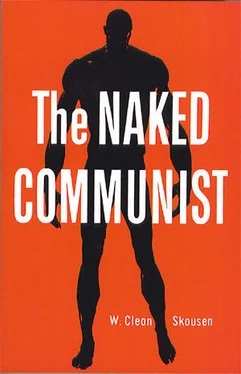Three days later six or seven persons followed the casket of Karl Marx to Highgate cemetery in London and there his one abiding friend, Friedrich Engels, read a funeral oration. It was the kind of oration Marx would liked to have heard. It granted him in death what Marx was never granted in life unequivocal tribute of glowing praise.
Thus ended the dynamic, turbulent and restless career of Karl Marx. By all standards it was a pathetic life, filled with burning ambition, constant frustration and continuous failure. Whether seen from the viewpoint of friend or foe, perhaps the real tragedy of Marx’s life can be found in the fact that for some amazing reason he almost instinctively planted the seeds of self-destruction in any project he promoted.
One cannot pore over the almost endless products of his pen—the weighty, complex books or the reams of sniping, feverish correspondence without feeling that Karl Marx projected into Communism the very essence of his own nature. His resentment of political authority expressed itself in a ringing cry for universal revolution. His refusal or inability to compete in a capitalistic economy wrung from him a vitriolic denunciation of that economy and a prophecy that its destruction was inexorably decreed. His deep sense of insecurity pushed him to create out of his own imagination a device for interpreting history which made progress inescapable and a Communist millennium unavoidable. His personal attitude toward religion, morals and competition in everyday existence led him to long for an age when men would have no religion, morals or competition in everyday existence. He wanted to live in a classless, stateless, noncompetitive society where there would be such lavish production of everything that men, by simply producing according to their apparent ability, would automatically receive a superabundance of all material needs.
Another characteristic of Marx which he shared with his intellectual off-spring—Communism—is that both must be viewed from a distance to be admired, even by friends. It is for this reason that biographers often treat Marx as though he were two persons. From a distance they might feel to admire his theories but upon close contact Marx becomes a different entity. Thus, Bakunin could call Marx the “supreme economic and socialist genius of our day” and then give the following evaluation of Marx, the man: “Marx is egotistical to the pitch of insanity….
“Marx loved his own person much more than he loved his friends and apostles, and no friendship could hold water against the slightest wound to his vanity…. Marx will never forgive a slight to his person. You must worship him, make an idol of him, if he is to love you in return; you must at least fear him if he is to tolerate you. He likes to surround himself with pygmies, with lackeys and flatterers. All the same, there are some remarkable men among his intimates. In general, however, one may say that in the circle of Marx’s intimates there is very little brotherly frankness, but a great deal of machination and diplomacy. There is a sort of tacit struggle and a compromise between the self-loves of the various persons concerned; and where vanity is at work there is no longer place for brotherly feeling. Every one is on his guard, is afraid of being sacrificed, of being annihilated. Marx’s circle is a sort of mutual admiration society. Marx is the chief distributor of honours, but is also the invariably perfidious and malicious, the never frank and open, inciter to the persecution of those whom he suspects, or who had the misfortune of failing to show all the veneration he expects. As soon as he has ordered a persecution there is no limit to the baseness and infamy of the method.”
The acid of boiling intolerance which Marx frequently poured down on the heads of his followers may be partially explained by his own complete certainty that the theories he had concocted were infallible gems of cosmic truth. In his heyday of abounding strength Marx often bowled over his opposition with mountain-moving declarations of supreme self-confidence:
“Historical evolution is on your side,” he shouted to his followers. “Capitalism, brought into being by the laws of historical evolution, will be destroyed by the inexorable working of these same laws. The bourgeoisie, the business manager of the capitalist system, appeared on the stage of history with that system, and must make its exit when that system walks off the stage. You, proletarians, keep capitalism going by your labour, and maintain the whole of bourgeois society by the fruits of your industry. But socialism will be a necessary organic outcome of capitalism, the essence of the latter being implied in the essence of the former. With the end of capitalism, comes the beginning of socialism as a logical consequence. You proletarians, as a class, being the incorporators of the forces and tendencies which will do away with capitalism, must necessarily make an end of the bourgeoisie. You merely need, as a class, to fulfill the evolution which your mission calls on you to fulfill. All you need is to will! History makes this as easy as possible for you. You need not hatch out any new ideas, make any plans, discover a future State. You need not ‘dogmatically anticipate the world.’ You need merely put your hands to the task which is awaiting you. The means by which you will do it are to be found in the unceasing, purposive, consistent fighting of the class struggle, whose crown will be the victory of the social revolution.”
When Marx died there was little to suggest to him in his closing hours that he yet would be remembered for the thing he had striven unsuccessfully to produce—a genuine revolution. While Western Europe wrote off revolutionary violence as a mere phase of Nineteenth Century social reform, a great slumbering giant in Eastern Europe was about to be rudely awakened by Marx’s revolutionary call to arms. This, of course, was Russia.
Before studying the revolution in Russia, we must turn to a brief review of the theories which Karl Marx and Friedrich Engels left as a legacy to the disciples of World Communism. In these theories may be found the explanation for many things in the Russian Revolution and in subsequent Communist activities which otherwise might be difficult or impossible to understand.
CHAPTER TWO
The Appeal of Communism
“How could a great scientist or anyone with so much education fall for Communism?” During the past 20 years this question has echoed around the land with each fresh exposure of Red espionage. It has been amazing to many people to discover that Communism appeals to certain educated individuals because it includes an intriguing “philosophy of nature.” In this philosophy Communism does seem to explain the origin and development of everything in existence—life, planets, galaxies, evolution, and even human intelligence. To those who have not previously delved into philosophy these concepts sometimes prove infatuating and persuasive. Therefore, in this chapter we shall deal with them.
Perhaps this material may prove to be difficult reading. However, the theories of Communism will be far easier to digest in this brief, concentrated form than they would be if the student attempted to spend several months digging them out of far-flung, technical treatises in Communist literature.
Every student should pursue his studies of Marxism until he has discovered the answers to such questions as these:
• What is the Communist “law of opposites”? What is the “law of negation”? Explain the “law of transformation.
• How does the Communist philosopher explain the origin of life? Does the universe have a designer or a purpose?
• What is meant by the Communist concept that everything is the result of accumulated accident?
Читать дальше











